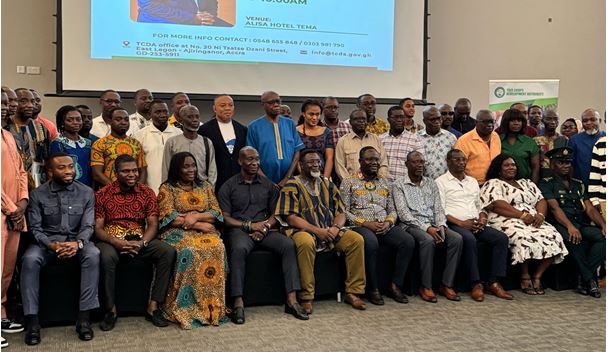GH¢22.5m lost annually to unchecked rubber exports
By Joshua AMLANU
The Tree Crops Development Authority (TCDA) has warned that the country could be losing as much as GH¢22.5million annually due to the unchecked export of raw rubber.
To curb the losses and protect local processing industries, the Authority has directed all exporters of rubber, cashew and shea to seek written approval before shipping these crops abroad. The measure aims to boost value addition and strengthen the domestic economy.
Andrew Osie Okrah, acting Chief Executive Officer-TCDA, in an interview following a high level stakeholder forum on the regulatory framework governing the rapidly growing tree crops sector, said the directive – which took effect on May 2 – seeks to ensure raw materials are made available to local factories before any export is permitted.
“We are not banning exports,” he clarified. “We are saying let’s ensure our factories are well-fed before we export. That’s the law,” he said.
He noted that the nation loses nearly GH¢22.5million annually from the export of roughly 3,000 metric tonnes of unprocessed rubber, based on an estimated value of GH¢450 per tonne.
The Acting CEO warned that if the current trend continues, Ghana could see widespread job losses in the rubber processing industry – which currently employs over 1,400 workers and has the potential to create up to 6,000 jobs under a 24-hour production model.
Local industry players say lack of enforcement over the past few years has made the rubber value chain increasingly fragile.
Emmanuel Akwesi Owusu, President-Association of Natural Rubber Actors of Ghana (ANRAC), said side-selling and unregulated exports have undermined efforts to grow the industry sustainably. Farmers are defaulting on loans because they are being undercut or even robbed of their produce, while processors face a critical shortage of raw materials.
“At least one factory has collapsed,” Mr. Owusu said. “Others are operating at just 60% of their capacity.”
Ghana currently produces about 100,000 metric tonnes of rubber annually, but about 40% is exported – much of it unprocessed. According to Owusu, the value loss from this is significant. With global prices around US$700 per tonne, the outflow of 40,000 tonnes in unprocessed form represents a major missed opportunity to generate foreign exchange and add value locally.
The TCDA, which was established in 2020 under Act 1010, has only recently begun enforcing its regulatory mandate across the tree crops sector. Okrah said the Authority has activated Regulation LI 2471, which requires exporters to notify and receive approval from the TCDA before shipping rubber, cashew or shea abroad.
Stakeholders from the Ghana Revenue Authority, Customs Division, Port Authority and Ghana Shippers’ Authority have all signed on to the directive, pledging to enforce the new rules at the country’s ports.
Mr. Owusu welcomed the move, saying it would breathe new life into the rubber industry. “With regulation in place, we can stabilise the industry, improve farmers’ incomes and generate more employment along the value chain – from processing to transport,” he said.
The lack of regulation in recent years has also discouraged commercial investment. Mr. Owusu noted that between 1995 and 2018, more than 35,000 hectares of rubber were planted through government-backed schemes. However, that momentum has slowed considerably in recent years as financial institutions have withdrawn from the sector.
Analysts say enforcing the directive could help reverse the decline and boost confidence among lenders. Local processors, given steady access to raw materials, can expand operations and improve Ghana’s foreign exchange position.
“The more we process here, the more FX we earn,” Mr. Owusu added. “This can help stabilise the cedi.”
While Ghana’s rubber quality is regarded as one of the best in West Africa, the ANRAC president said without reforms to ensure consistent supply and investment, the country risks falling behind competitors.
For now, the TCDA’s directive signals a turning point. “If we all play our part,” the Acting CEO said, “we can protect jobs, grow our industries and retain value here in Ghana.”
The post GH¢22.5m lost annually to unchecked rubber exports appeared first on The Business & Financial Times.

